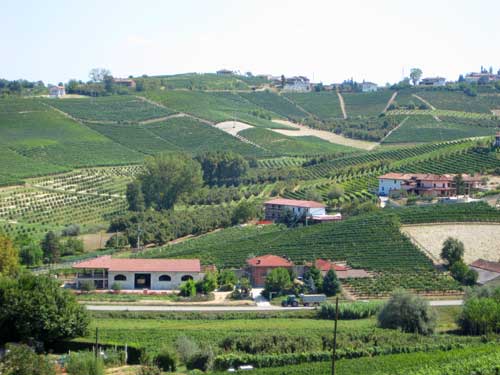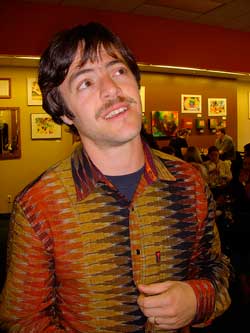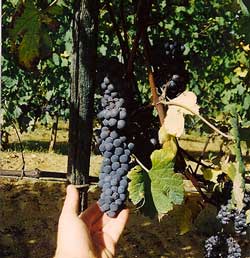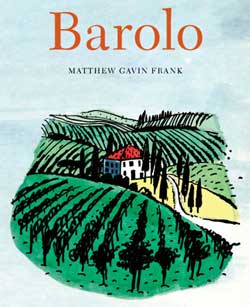
“The Unfinished”, A Remarkable and Enchanting Tale in Barolo
Guest Blog by: Matthew Frank
To research “Barolo” Matthew Frank (http://matthewgfrank.com/?page_id=137) spent six months in Barolo, Italy (pop. 646), living out of a tent in the garden of the local Pittatore farmhouse. Through the Pittatore family, he was able to secure work picking wine grapes for famed vintner Luciano Sandrone. Through Sandrone, Frank developed relationships with the region’s families, restaurateurs, butchers, vintners, local foodstuffs, odd markets, and circus-like atmosphere in experiences both gustatory and death-defying. Barolo on Amazon.com – http://www.amazon.com/Barolo-At-Table-Matthew-Frank/dp/0803226748
VintageTexas Note
Having recently visited Barolo and neighboring Barbaresco, it was fastenating to compare and contrast the wines and the deepseeded wine culture of this part of Italy with those now developing in Texas (See: https://vintagetexas.com/?p=1124 & https://vintagetexas.com/?p=1138). In my short stay there, I learned much, but envy Matthew, as he had the time to assimilate into to the region, bonded with its people, and have a “bare naked” experience with their culture.
Author’s Note
This piece, excerpted from my memoir, BAROLO (The University of Nebraska Press, 2010, originally appeared, in slightly different form, in The Best Travel Writing 2009 anthology (Travelers’ Tales ‘ Solas House).
“The Unfinished”
 The air is so crisp you can break it like a cracker. And as the crumbs fall to the truffle soup, they hit bottom and become mountains. The Alps break from the Piedmont haze and I open my arms to them. Adriana’s day-old apple cake still sits cross-wise on my teeth like a cement that refuses to dry. The vineyards are everywhere, pitching me over slopes less drastic, but more numerous than those on the way to La Morra, Italy. The occasional residence asserts itself, pushing its washed-out white stone, cracked orange roof, rusted black gate from between the rows, then, just as quickly, disappears like a lioness. I feel I am somehow being stalked by structure and, as always, barely escaping with my life.
The air is so crisp you can break it like a cracker. And as the crumbs fall to the truffle soup, they hit bottom and become mountains. The Alps break from the Piedmont haze and I open my arms to them. Adriana’s day-old apple cake still sits cross-wise on my teeth like a cement that refuses to dry. The vineyards are everywhere, pitching me over slopes less drastic, but more numerous than those on the way to La Morra, Italy. The occasional residence asserts itself, pushing its washed-out white stone, cracked orange roof, rusted black gate from between the rows, then, just as quickly, disappears like a lioness. I feel I am somehow being stalked by structure and, as always, barely escaping with my life.
Persimmon trees tower above the rows, but hang still today, keeping their secrets. Somewhere around a curve, behind a slew of vineyards, Sandrone is commanding his grape-picking crew, Ivo and company are loading the crates onto flatbeds, Ercole, local chef extraordinaire, is washing leeks for a stock, Raffaella, my host at the Il Gioco dell’Oca agriturismo, is smoothing sheets for the day’s guests, raw grissini is getting its cornmeal dust, wine is being sold, the Borgognos are harboring their quiet, cross-eyed animosity, and Adriana, Raffaella’s mother, is doing my laundry. But here, now, curving left around a profiled slope, the hamlet of Monforte pokes its rose-colored head from a distant hillside like a turtle testing for rain. Finding none, finding only clarity and windlessness, it remains, pushing shopfront after shopfront, terrace after terrace up from the dirt and into the air.
It is a vertical town, even more so than La Morra, stacked, switchbacked, and as the trail descends at my feet, Monforte disappears once again behind a swell of green earth. I stop. No sound. No wind. I drop my hands to my sides. The air, like an Egyptian plover, cleans my mouth of breakfast. But there is no wind.
If there is no wind, why do I hear the grapevines slushing on the downslope? To the right, the crops gather together as clouds. The vineyard is imploding in front of me, closing its leaves into a fist, a concentrated heart of green. I expect Nebbiolo grape juice to run like blood over my shoes. I expect it to open itself into a first beat. And when it does, leaves deafening as wings, the vineyard spreads its aorta wide open and belches, at my feet, not blood, not love, but two hunchbacked old men.
They are more wrinkled than wrinkled. They are over-wrinkled, über-wrinkled, sun-dried as tomato. The liquid was cooked from their skin long ago. Will the circus of Italy never end? What next? Will I look to the sky and see a helmeted brown bear riding a unicycle along a tightrope?
The men’s’ noses come at me first, riding parallel in the air as two brown bodies on a slab. They shake the vineyard leaves from their white hair, loose rooster necks shuddering. Their eyes find me, laser blue, and two steady smiles spread like jam across their faces.
“Ciao,” the man on the left sings in a surprising and pinched soprano.
His voice reaches like an unoiled hinge: rusted, stiff, but still functioning.
“Ciao, ciao,” I say.
He squints at me, studying the accent that laces my “Ciaos.”
“Americano?” he asks.
“Si,” I say, smiling, nodding.
“Mi chiamo Guiseppe,” he continues, fanning the hinge open, closed, open, closed, “Questo é mio fratello, Renato.”
Guiseppe holds a hand at his thick throat and covers his mouth, indicating that Renato can not speak.
 Both men push their hands to me and I shake them—each one heavier than it looks, grittier than granite. Renato takes a step back toward the vineyard that, not two minutes ago, birthed him onto this trail. His hands reach for his hips, find them, and, staring at the snarl of grapes, the wrinkles run from his face. He is so placid, I’m not sure if he can’t talk, or if he just doesn’t need to. The pride in his newly smoothed face, the pride of a father whose child has just successfully pedaled a bicycle for the first time, tells me that this vineyard belongs to him, or to both of them. But I have to ask.
Both men push their hands to me and I shake them—each one heavier than it looks, grittier than granite. Renato takes a step back toward the vineyard that, not two minutes ago, birthed him onto this trail. His hands reach for his hips, find them, and, staring at the snarl of grapes, the wrinkles run from his face. He is so placid, I’m not sure if he can’t talk, or if he just doesn’t need to. The pride in his newly smoothed face, the pride of a father whose child has just successfully pedaled a bicycle for the first time, tells me that this vineyard belongs to him, or to both of them. But I have to ask.
“Queste uve…” I say, struggling with my Italian this morning, “le tue?”
“Oh, si, si,” Guiseppe sings so much like Farinelli, I expect his gray hair to tie itself into two waist-length castrato braids.
Renato looks from the grapes to me. His wrinkles are back. He kisses his fingertips and holds his hands to the sky. The gesture is saturated in so much drama and summoning power that I expect the weather to change at once.
“Desidera Barolo?” Guiseppe enunciates slowly, chasing the clouds away.
I should be surprised, but I’m not. Am I becoming desensitized to charity and luck? I should be chastised for this, but instead, a sigh springs from my stomach to my throat. It is the sigh of the poolside lawn-chair, of sipping lemonade through a straw.
I shrug. I look toward Monforte. It remains in hiding behind the hillside. I wonder if it is still there. Barolo, Monforte, Barolo, Monforte? Barolo.
“Si,” I say.
Their cantina is tiny. If Sandrone’s cantina is the penthouse, theirs’ is the broom closet. It is more ancient than their faces; it must be the entity that spawned these two gentlemen—the Alessandria brothers, as indicated by a wooden hand-carved sign over the cantina’s doorway: Fratelli Alessandria. Indeed, the entire cantina seems constructed of wood and sawdust, a relic, a hold-over, an unsafe roller-coaster from three generations past. The cantina is rickety and dim. A single brown lightbulb shines as if from the bottom of a coffeepot. The whole place, including the brothers themselves, seems in the process of fermenting.
Medieval wheelbarrows line the walls and I expect to see them full of bodies, crushed by catapult and plague, ruined by arrows and hot tar. But instead, they offer, in both smell and sight, the organ meat tangle of flattened grapes, skins, branches. The brothers parade along the wheelbarrows as if soldiers guarding a drawbridge, and Renato holds his hand to the wall behind me. I turn and am stunned to see steel. In the muddy, reflected light, three tanks stand equipped not with scaffolding as in Sandrone’s cantina, but with makeshift ladders, crooked rungs, wooden to be sure.
Guiseppe begins to pull thin scarf-strings of Italian from his throat, telling me about their business, how wine-making has been in their family for centuries. Renato punctuates Guiseppe not with voice, but with gesture, oftentimes karate-chopping upward to either dispute or emphasize his brother’s statements. Only one is speaking, but these brothers interrupt each other like Abbott and Costello. They are choreographed.
Renato reaches for the ladder in the middle as if for an axe. I strain to hear any trace of a dungeon torture scream from inside the tank. But only: the gong of his ancient knees against the steel and the silk sloshing of three wine glasses being filled. Renato hands first to Guiseppe, then to me. In this light, the wine is black. Guiseppe offers his glass to the ceiling shadows. I hold mine to my nose and: hay, sawdust, slaughter; then: truffle, blackberry, pine; fruitcake baked in a coffin. Even here: even in the dungeons of Italy, elegance is fostered by four seventy-year-old hands. Guiseppe mutters a toast like a private prayer only Renato can understand.
“Bravo,” I say and clink glasses with the brothers.
 I sip and am immediately struck on the tongue by a sense of the unfinished. This wine seems to be in the process of coalescing, each element intermingling for the first time. My mouth goes yeasty and robust, sticky almost with fat and marrow, oxtail and liver. Then, on the greasy swallow, the wine inexplicably sparkles like a champagne—an element I haven’t yet experienced with a Barolo—leaves the mouth cleaned and ready for another sip.
I sip and am immediately struck on the tongue by a sense of the unfinished. This wine seems to be in the process of coalescing, each element intermingling for the first time. My mouth goes yeasty and robust, sticky almost with fat and marrow, oxtail and liver. Then, on the greasy swallow, the wine inexplicably sparkles like a champagne—an element I haven’t yet experienced with a Barolo—leaves the mouth cleaned and ready for another sip.
Another sip leads to another sip and then another, the dark privacy of the cantina now bright enough, the outdoors fading into a morning dream, disappearing like Monforte behind a hillside.
I sip the last of my third glass and Renato, obviously trained to balk at empty crystal, grabs it from my hand and fills it a fourth time. The more he drinks, the more comfortable he seems on the ladders. He hands me my glass and climbs down like a cat along a window-ledge. He’s becoming younger with each sip. I wonder if, after ten glasses, he will get his voice back. We toast again to Guiseppe’s mystery prayer. We talk of Il Gioco dell’Oca and Sandrone. In mid-sip, Guiseppe, dribbling wine from the corners of his mouth, invites me to stay at their house. He scowls at the idea of sleeping in a tent.
“No, no,” I laugh, “Va bene, va bene.”
Soon, this glass is vanquished like the others. The thought of the outdoors and Monforte returns. I buy a bottle of Barolo from the Alessandria’s; Renato drops it into a paper bag, and they walk me to the front of the cantina. Guiseppe lays a hand on my left shoulder, Renato on the right. They are pressing a story into me that won’t find its words until later. They say Ciao with their eyes.
The outside cool plays in my hair, rests on my head like a helmet. I turn back to the cantina and see the brothers’ faces poking like trolls from the doorway, which itself seems disguised in the pattern of a giant tree trunk. When the door closes, the world becomes relatively real again, the fable receding into the vineyards behind me. The air smells only of early-afternoon and, rolling my shoulders toward my ears, I am struck with the desire for words in any form.
Taking small steps toward Monforte, I pull the bottle of Barolo from the paper bag in the hope of simply reading the words Fratelli Alessandria. I am greeted instead with the final hammering of the brothers’ rustic operation. An unusual joy expands from my chest to my ribs. Monforte lifts itself once again from behind the hillside and reflects the sun from its windowpanes to the bottle in my hands which reclines in a lawn-chair of its own: dusty, purple, entirely unlabeled.

wonderful read, amigo, but I daresay the folks in Texas have a little more mental freedom than the Albese. Give me Texas anyday, and this from a hard-core Italophile.
I have had good drinking experiences in Texas with Barbera, Nero d’ Avola, Vermentino and Muscat Canelli. But, I do not hold out hope for Nebbiolo until we can find some of the blue clay of Barolo buried somewhere in the hills of central Texas.
Russ
Alfonso,
Love the Texas “nationalism.” I can’t help but try to fuse it with the Italophile designation, and situate it in the realm of the kitchen. I keep coming up with barbecue brisket smothered in white truffles…